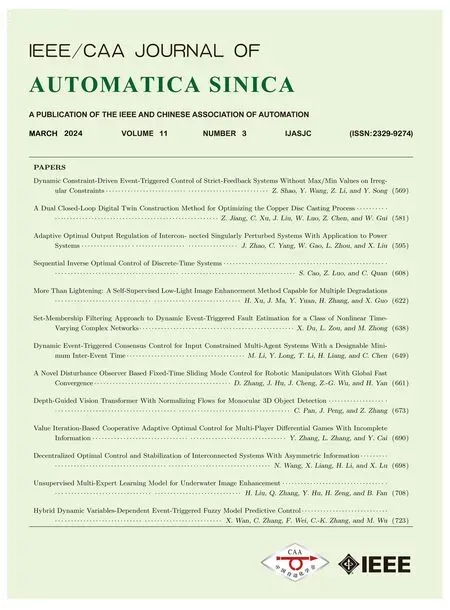Exponential Synchronization of Delayed Stochastic Complex Dynamical Networks via Hybrid Impulsive Control
Yao Cui , Pei Cheng , and Xiaohua Ge ,,
Dear Editor,
This letter addresses the synchronization problem of a class of delayed stochastic complex dynamical networks consisting of multiple drive and response nodes.The aim is to achieve mean square exponential synchronization for the drive-response nodes despite the simultaneous presence of time delays and stochastic noises in node dynamics.Toward this aim, a hybrid impulsive controller, featuring both delayed and non-delayed impulses, is developed.Sufficient conditions of mean square exponential stability of the delayed stochastic synchronization error system are then derived.It is further shown that exponential synchronization can still be preserved even if the impulsive controller involves only delayed impulses.An illustrative example is finally presented to demonstrate the effectiveness of the obtained theoretical results.
Complex dynamical networks (CDNs) are networks consisting of multiple interconnected nodes (or subsystems) where each node has its own dynamical behavior.Examples of such networks include power grids [1], multi-agent systems [2], connected vehicles [3], [4],and distributed games [5].The concept of synchronization in CDNs refers to the ability of the nodes within the network to reach a coordinated objective.So far, several effective synchronization control methods, such as adaptive synchronization control [6], sampled-data synchronization control [7], intermittent synchronization control [8],impulse synchronization control [9]-[11], have been developed for various CDNs.Among these methods, the impulse control strategy has attracted a great deal of attention due to its simple structure and discrete nature of implementation, and finds potential applications in various energy efficiency scenarios owing to its low energy consumption at impulse instants.
Impulsive control for CDNs relies on the feedback information transmitted from the drive nodes to the response nodes at discrete instants.However, due to measurement failures, restricted transmission rates over communication networks and other uncertainties at the sampling instants, the feedback data may suffer from time delays as well.Given this fact, how to explore delayed impulses and develop effective impulsive control approach to synchronization of CDNs is of great significance.However, it should be noted that the delayed impulses are treated as a kind of interference in many existing results, such as [9]-[11].This may introduce certain conservatism into the analysis and design criteria.On the other hand,although many impulsive synchronization control results have been available to CDNs, there has been a few concerning about the simultaneous presence of time delays and stochastic noises in system dynamics.It is well acknowledged that delays and/or stochastic noises can cause oscillation and instability of the CDN, and further make the impulsive synchronization control issue quite challenging.
Motivated by the above discussion, we revisit the exponential synchronization problem of a class of delayed stochastic CDNs.Our focus is laid on the inclusion of both time delay and stochastic noise in the system dynamics and further the development of an effective hybrid impulsive controller.The main contributions are twofold.1)A hybrid impulsive controller incorporating both delayed and nondelayed impulses is designed to account for the phenomenon that the transient behavior of impulses depends on both the current and historical information of the synchronization error system subject to time delay and stochastic noise.2) Numerically tractable criteria in both hybrid and delayed impulsive control cases are derived to preserve the mean square exponential stability of the delayed stochastic synchronization error system.The explicit relationship between the inherent nonlinearities in the node dynamics and the proposed impulsive controller parameters can be established.To deal with delayed impulses, different from [9]-[11], we provide a better impulse estimation in the proof of our main result, based on which we also show that the stability criterion in the case of delayed impulsive control only can be readily derived.
Problem formulation: Consider a class of drive-response system whose dynamics can be described by a stochastic CDN of the following stochastic delayed differential equations:
In this study, we propose a hybrid impulsive controller of the following form for each response nodei,i∈{1,2,...,N}:

Remark 1: In particular, ifK=0, the controller (3) reduces to a non-delayed impulse controller which has been intensively employed in the literature; see, e.g., [13], [14].On the other hand, ifL=0, then the controller becomes a completely delayed impulse controller,which seems more practical.This is because the drive nodes are often remotely located from the response nodes, meaning that the drive nodes’ states {xi(t)} may experience transmission delays (say τ) when arriving at the corresponding response nodes.As a result, the delayed errorei(t-τ) should not be neglected during the construction of an impulsive synchronization controller.
Substituting (3) into (2) and combining (1) yield the following synchronization error system:




Fig.1.The resulting synchronization errors: (a) Without impulsive control;(b) With hybrid impulsive control; (c) With only delayed impulsive control.
Conclusion: In this letter, we have presented a hybrid delayed and non-delayed impulsive control method to solve the synchronization problem of a class of delayed stochastic complex networks.We have established explicit sufficient conditions on the exponential stability in mean square for the resulting synchronization error system even in the presence of time delays and stochastic noises.We have also studied the special case of completely delayed impulsive control and derived the corresponding stability criterion.We have finally provided a numerical example to validate the proposed main results.
Acknowledgments: This work was supported in part by the National Natural Science Foundation of China (11771001) and the Key Natural Science Research Project of Universities of Anhui Province, China (2022AH050108).
 IEEE/CAA Journal of Automatica Sinica2024年3期
IEEE/CAA Journal of Automatica Sinica2024年3期
- IEEE/CAA Journal of Automatica Sinica的其它文章
- Set Stabilization of Large-Scale Stochastic Boolean Networks: A Distributed Control Strategy
- Dendritic Deep Learning for Medical Segmentation
- Achieving 500X Acceleration for Adversarial Robustness Verification of Tree-Based Smart Grid Dynamic Security Assessment
- Communication-Aware Mobile Relaying via an AUV for Minimal Wait Time: A Broad Learning-Based Solution
- Simulation Analysis of Deformation Control for Magnetic Soft Medical Robots
- Multi-Timescale Distributed Approach to Generalized-Nash-Equilibrium Seeking in Noncooperative Nonconvex Games
